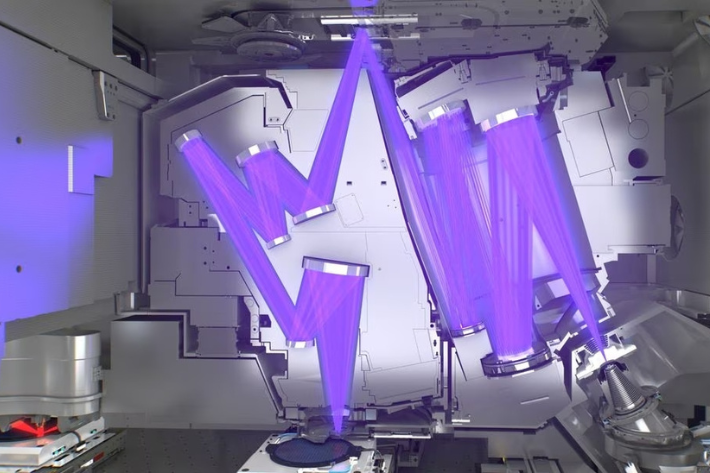In the latest hit for China’s chipmakers, the Netherlands government on Friday announced new controls that will restrict its chipmakers, including ASML, from exporting advanced semiconductor equipment.
While the rules did not explicitly name China, the Dutch announcement comes amid US pressure on its allies to curb sales of high-tech components to the country.
“We have taken this step in the interest of our national security” Dutch trade minister Liesje Schreinemacher said, adding that such equipment may have military applications.
Also on AF: China Curbs Mean Permanent Loss of Opportunities for US, Nvidia Says
Schreinemacher added the rules will affect only a “very limited” number of companies and product models. A technical document specifying which equipment will require a licence accompanied the announcement.
The restrictions aimed to address “important vulnerabilities without unnecessarily disrupting the global production of chips,″ she was quoted as saying in a report by the Associated Press.
The rules will require companies that make advanced chipmaking equipment to seek a licence before they can export it. They will come into effect on September 1.
Clampdown on top ASML machines
Europe’s most valuable company, ASML, said it will now need to apply for licences to export all of its most advanced deep ultraviolet lithography (DUV) systems, which are used to manufacture computer chips.
The chip equipment-maker has a near monopoly on the manufacture of lithography systems. Those machines are vital for chipmakers to produce advanced semiconductors.
While ASML’s most advanced machines – extreme ultraviolent “EUV” lithography systems – have never been exported to China due to pre-existing restrictions, the company had been shipping lower-quality DUV systems to the country.
New restrictions would mean the company would now have to apply for licences for those exports as well.
Responding to the new Dutch restrictions, ASML said it would not need to change its financial guidance.
ASML’s shares were down 3.6% after the news, while smaller rival ASM International dipped 1.8%.
US likely to add to restrictions
The introduction of the Dutch rules is the result of a high-level agreement between the US and its two allies – The Netherlands and Japan – to tighten restrictions as Washington seeks to hobble Beijing’s ability to make its own chips.
In October, the US imposed export restrictions on shipments of American chipmaking tools to China from US companies like Lam Research and Applied Materials on national security grounds, and lobbied other countries with key suppliers to do similar.
Both US allies agreed, in principle, to join US efforts late last year. The three countries make for the the world’s leading producers of chipmaking equipment and have the know-how necessary for producing the most advanced chips.
Japan, home to chip equipment makers Nikon Corp and Tokyo Electron Ltd, has since adopted rules to restrict exports of 23 types of semiconductor manufacturing equipment that will take effect July 23.
With similar restrictions from the Netherlands set to take effect, the US is now looking to restrict foreign equipment with even a small percentage of US parts from reaching about six Chinese facilities, including a fab operated by state-owned SMIC, a person familiar with the matter said.
Chipmakers from the Netherlands and Japan depend on the US for key parts and components required to make their cutting-edge machines.
More US chip curbs to follow
The US may publish the planned rules by late July, along with names of the six facilities, sources said.
The rule will require chipmakers to apply for export licences, but applications intended for those six facilities will likely be denied, the person said.
It is not unusual for the US to modify proposals before clearing regulations, so both the timing and the restrictions could change. The plan described reflects thinking in late June.
The US is also expected to come out with other updates to its sweeping October rules in July, including a clampdown on exports of advanced artificial intelligence (AI) chips, based on chip-to-chip transfer rates.
China has previously decried the Washington’s sweeping chip war, part of a heightening of tensions between the two countries that has spanned everything from 5G equipment and alleged spy balloons to relations over Taiwan.
The US “has deliberately blockaded and hobbled Chinese companies and forcibly relocated industries and pushed for decoupling,” Liu Pengyu, Chinese Embassy spokesperson in Washington, said in January.
China would “closely follow the developments and firmly safeguard our own interests,” she said.
- Reuters, with additional editing by Vishakha Saxena
Also read:
Banned Nvidia Chips Available in China’s Underground Markets
US Risks ‘Enormous Damage’ With China Chip War: Nvidia CEO
Access to China ‘Essential’ as it Develops Chips: ASML CEO
US Chip Sanctions Have Hardly Impacted China’s AI Capability
Competition in Chip Industry an ‘All-Out War’, South Korea Says
US-China Rivalry May Spur Decoupling of Chip Sector – BBC
























